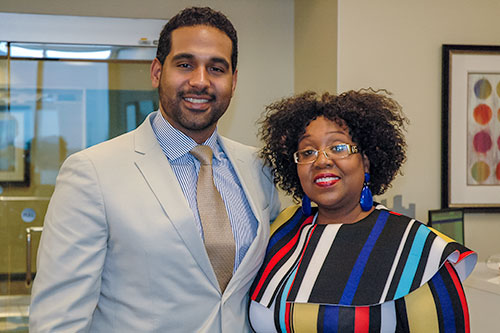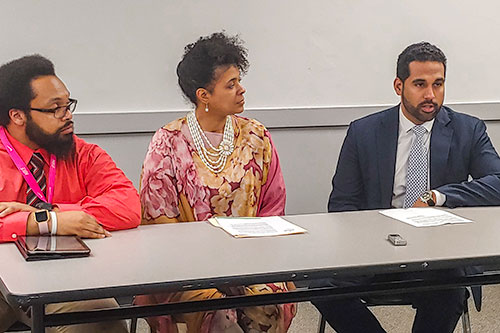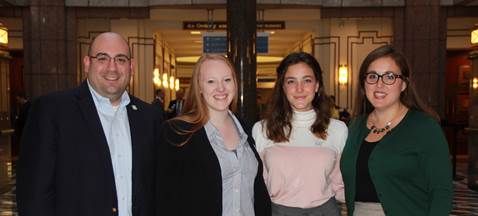Month: February 2019
Sen. Osten, Reps. Conley and De La Cruz Seek Priority Status For Gold Star Memorial Bridge Repairs

Sen. Osten, Reps. Conley & De La Cruz Seek Priority Status For Gold Star Memorial Bridge Repairs

GROTON—Declaring that the largest and longest bridge in Connecticut—the Gold Star Memorial Bridge—is a commuter necessity, a tourism priority, and essential to national security and the health of the regional economy, a group of Democratic lawmakers today urged Governor Ned Lamont and the state Department of Transportation to make renovations to the bridge a financial and public policy priority—and to implement tolls in Connecticut in order to help pay for it.
State Senator Cathy Osten (D-Sprague) and state Representatives Christine Conley (D-Groton) and Joe de la Cruz (D-Groton) issued their appeal today, the same day Gov. Lamont visited the Gold Star Memorial Bridge to make his case for tolls to help pay for Connecticut’s massive and long-overdue transportation infrastructure needs.
“Repairing Connecticut’s transportation infrastructure of bridges and roads can no longer be separated from the issue of instituting tolls. If we are serious about business and job growth in this state, and if we are serious about the safety of our daily commuters, we will pass a comprehensive tolls bill this session and we will use some of that future revenue to repair the Gold Star Memorial Bridge, which is in dire need of upgrades,” Sen. Osten said. “It’s time we joined the rest of the East Coast of America in creating a long-term, sustainable and fair revenue source for Connecticut’s needs, a user fee which asks out-of-state drivers to pay for the privilege of driving on our highways, like we have to pay everyone else. Let’s get ours.”
“I am very pleased that the governor and DOT recognize how important this bridge is to southeastern Connecticut,” said Rep. Conley. “Repairs to the Gold Star are imperative to ensure that this economic engine is preserved, but also that the structure is up to code for everyone who uses the bridge either daily or occasionally. This is great news for all of Connecticut.”
“The bridge is vital for commuters and commercial traffic, and especially for our manufacturers like Electric Boat,” said Rep. de la Cruz. “Making sure the Gold Star is able to serve the area, safely and efficiently, is critical, and I applaud the governor and DOT for their efforts in completing this long-overdue project.”
At more than a mile long, 155 feet high, and with a million square feet of surface area over a dozen travel lanes, the Gold Star Memorial Bridge is the largest bridge in Connecticut; it transports more than 42 million cars and trucks over the Thames River every year, crossing from New London to Groton. It was built in 1943 and is now three-quarters of a century old.
While the southbound lanes of the Gold Star Memorial Bridge were recently resurfaced, a much larger, much more expensive and much more complicated renovation of the northbound lanes awaits Connecticut commuters.
The DOT says the bridge is “is in need of significant rehabilitation” and estimates that strengthening steel trusses and truss bearings, repairing concrete piers, strengthening and replacing steel girders and girder bearings, replacing the bridge deck and parapet, repairing storm drains and replacing navigational beacons will cost at least a quarter-billion dollars and take six years to accomplish.
Due to those concerns, the northbound lanes of the Gold Star Memorial Bridge are currently “load-restricted” by the DOT, requiring 400-500 truckloads every year (some carrying submarine equipment for General Dynamics Electric Boat) to make a 30-mile detour.
The DOT has proposed a two-phase construction plan for the northbound lanes, with work on Phase One beginning in May 2020 and Phase Two ending sometime in 2025.
Nonprofit Which Offers Re-Entry Services to Ex-Offenders Supports Bradley’s Co-Introduced Bill

Nonprofit Which Offers Re-Entry Services to Ex-Offenders Supports Bradley’s Co-Introduced Bill

State Senator Dennis Bradley (D-Bridgeport) met with Heart for Hearts Inc. President Rhoda Huxstable to discuss legislation which will create a system of expungement of criminal records for ex-offender who have not offended for a significant period of time following their sentence. (February 22, 2019)
BRIDGEPORT, CT—Last week, State Senator Dennis Bradley (D-Bridgeport) met with Heart for Hearts Inc., a nonprofit organization that offers re-entry services for formerly incarcerated individuals, to talk about criminal justice reform. Sen. Bradley commended Heart for Hearts Inc., for helping to build the foundation for people to have a second chance.
“Heart for Hearts Inc., is providing much-needed services to truly assist ex-offenders’ reform efforts,” said Sen. Bradley. “The work they do is a testament to the positive impact a community can have when it comes together to deal with important issues and help one another.”
Sen. Bradley has co-introduced legislation to expunge the records of non-violent offenders who have not offended for a certain period of time. If passed, Senate Bill No. 691, “AN ACT CONCERNING THE EXPUNGEMENT OF CRIMINAL RECORDS,” will create a system of expungement of criminal records for offenders who have remained offense free for a significant period. The Judiciary Committee voted to develop formal language for this legislation.
“When an individual has paid their debt to society, and remained clean for a significant period of time, they should not be repeatedly punished by the system,” said Sen. Bradley. “The justice system works best when it not only punishes unlawful behavior, but also provides and celebrates reform, to ensure the unlawful behavior will not be repeated.”
The re-entry program at Heart for Hearts Inc., aims to increase ex-offender and family stability while promoting healthy, productive lifestyles. They provide assistance in resume writing, housing, transportation, financial literacy, and parenting/family support, according to their website. The president of Heart for Hearts Inc., Rhoda Huxstable said she and her staff support Sen. Bradley’s legislation.
“It’s important to pass this legislation so people can find employment in areas they normally wouldn’t,” said Huxstable.
Heart for Hearts Inc., board member and volunteer Latoya Still said some ex-offenders lacked a foundation from which to build a successful, lawful life. She said they are much more than their past mistakes.
“Everyone deserves a second chance,” said Still. “People make mistakes and I feel that just because you made a mistake in your past, it does not mean you’re unable to grow from that mistake.”
Ramon Coriano is a mentor at Heart for Hearts and an ex-offender. He said he understands the hardships which come with growing up without a solid foundation at home and the struggles ex-offenders face when they come home. He said if an ex-offender is on the right track, and has not offended; expunging their record will mean more job opportunities increasing the odds they will not offend again.
“People are trying to change their lives,” said Coriano. “We should give them the opportunity to come back to society and contribute. We should not build a block that keeps them from getting a job.”
Local Teachers Support Bradley Bill to Increase Minority Teacher Hiring, Recruitment and Retention

Local Teachers Support Bradley Bill to Increase Minority Teacher Hiring, Recruitment and Retention

During a press conference, State Senator Dennis Bradley (D-Bridgeport) talks about the importance of increasing diverse teaching populations in Connecticut as educators Sheree Baldwin-Muhammad (middle) and Ryan Brown (left) look on. February 25, 2019).
BRIDGEPORT, CT—Today at a press conference, local teachers gave their support for State Senator Dennis Bradley’s (D-Bridgeport) bill to increase minority teacher recruitment and retention in Connecticut Schools. Bradley said he is committed to seeing this legislation through. He said diverse teacher populations in Connecticut schools must become our new normal.
“What we’re establishing are guidelines as to what is normal, and right now what normal equals in a lot of school districts, including Bridgeport, is not including people of color in terms of being able to facilitate ways to make them educators,” said Sen. Bradley. “The goal is to have a plan which will ensure every child has an opportunity to have a teacher of color in the classroom that can positively impact their lives.”
If passed, Senate Bill No. 462 “AN ACT CONCERNING GUIDELINES FOR INCREASING DIVERSE TEACHING POPULATIONS,” will establish guidelines to be used by local and regional boards of education that will assist in increasing the number of minority teacher hires by at least two percent annually over the next five years and may include provisions relating to teaching assistant programs that encourage minority high school students to pursue a career in teaching. Bradley said a collaborative effort is needed for this legislation to be effective.
Ryan Brown, an African American man who teaches seventh grade Math at Read School, said he fully supports this proposed legislation. Brown said although some progress has been made, there is much more which should be done to truly diversify the teaching profession in Connecticut.
“While it is promising that our state has already begun the work on improving minority teacher recruitment and retention, we need to take bigger steps,” said Brown. “Our student population is becoming increasingly more diverse, but our teacher of color population is falling behind, failing to close this gap. If we want our students of color to know they are welcomed in the teaching profession and to view it as a viable profession; we have to show them examples.”
Sheree Baldwin-Muhammad, an African American woman who teaches second grade and has 25 years of experience in the education field, agreed with Brown and added that increasing the diversity of teaching populations in Connecticut will benefit students academically, too
“I firmly believe that the population of teachers should mirror that of their students,” said Baldwin-Muhammed. “That is not to say that any quality teacher, of any race cannot teach students of color well. However, research has proven that when students of color are taught by the same race, students feels more comfortable, show more interest and effort in their work and have higher college aspirations.”
The bill was referred to the Education Committee on January 24. Sen. Bradley said he is committed to increasing minority teacher recruitment, hiring and retention and he is looking forward to working with his colleagues to get this legislation passed.
“We’re going to try our hardest to make sure it happens this year,” said Sen. Bradley. “It’s a collective effort and we’re hoping other legislators see the positives and pros of this bill.”
Citing New Developments in Zinke Investigation, Senator Osten Renews Call to Pass East Windsor Casino Bill
Citing New Developments in Zinke Investigation, Senator Osten Renews Call to Pass East Windsor Casino Bill
On the heels of a new development in the federal government’s investigation of disgraced former Interior Department Secretary Ryan Zinke, state Senator Cathy Osten (D-Sprague) today once again called for the General Assembly to pass Senate Bill 11, her bill which seeks to clarify the federal Department of the Interior’s role in approving minor changes to the existing Tribal-State Compact between the Mohegan and Mashantucket Pequot tribes and the State of Connecticut.
Those changes that are needed in order for the tribes to operate a new casino in East Windsor.
A public hearing on Sen. Osten’s Senate Bill 11—which has 22 bipartisan co-sponsors—will be held before the Public Safety and Security Committee at 10 a.m. tomorrow, Tuesday, February 26, 2019, in Room 1-E of the Legislative Office Building in Hartford.
“The stench surrounding Ryan Zinke’s role in this tribal delay is overwhelming, and the fact that a grand jury is now hearing new evidence about Zinke’s role in this is even more reason to pass Senate Bill 11 and get on with the business of creating jobs and growing Connecticut’s economy,” said Sen. Osten, who is vice-chair of the Public Safety Committee. “We can’t let one man, who is now being investigated by federal authorities, stand in the way of what was green-lighted a year and a half ago by another Interior Department official. It’s outrageous.”
Citing unnamed sources, The Washington Post reported this past weekend that federal prosecutors have presented evidence to a grand jury regarding whether Zinke made false claims to investigators about his decision to deny a petition by the Mohegan and Mashantucket Pequot tribes to operate the East Windsor casino.
The Post reported that the Inspector General office of the Interior Department referred the matter to the Department of Justice “after its investigators became concerned that Zinke had lied to them about how he came to his decision on the casino”; Zinke resigned his post in December.
Senate Bill 11 is designed to secure quicker approval of the agreement between the state and the tribes to jointly operate the new East Windsor casino, which is being built to compete with the new MGM-owned casino in Springfield, Mass.
Legislators say the federal government’s foot-dragging in approving a minor amendment to the Tribal-State Compact is negatively impeding business development, job retention and growth.
The terms of original 1994 Tribal-State Compact were effective only “upon publication of notice of approval of this Compact by the Secretary of the Interior of the United States in the Federal Register,” according to federal law. That has already occurred.
But that 1994 Tribal-State Compact also stated that “the terms and conditions of this Compact shall not be modified, amended or otherwise altered except by written agreement of both parties” and with the afore-mentioned approval by the Interior Department.
In September 2017, U.S. Interior Department Acting Assistant Secretary for Indian Affairs Michael S. Black wrote the tribes and former Governor Dannel Malloy to say that Interior Department action on the amended Tribal-State Compact to operate the East Windsor casino “is unnecessary at this time” because “the tribes have entered an agreement with the state whereby they have agreed that the exclusivity provisions” of the original 1994 Tribal-State Compact “will not be breached by this arrangement.”
In May 2018, the Interior Department approved changes to the state’s compact with the Mohegans.
But the Interior Department has still not approved the changes to the Pequots’ compact: approval of both changes is necessary to begin operation of the East Windsor casino.
Senator Abrams Enews: Paid Family Medical Leave; Healthcare Bills To Public Hearing; Coffee Hours; Governor’s Budget
Flexer Bill to Protect Community Colleges Receives Local Support At Public Hearing

Flexer Bill to Protect Community Colleges Receives Local Support At Public Hearing

(left to right: State Rep. Pat Boyd, QVCC student RoxAnn Huckaby, QVCC student Jacqueline DuFour, and State Sen. Mae Flexer)
On Thursday, the Higher Education & Employment Advancement Committee held a public hearing and heard testimony on eight bills. Included on the docket was Senate Bill 749, “An Act Requiring Legislative Approval for the Merger or Closing of Institutions within the Connecticut State Colleges and Universities,” which was introduced by Senator Mae Flexer (D-Killingly).
The bill would change state law to require the General Assembly to approve any action the Board of Regents for Higher Education might take regarding merges or closures of any community colleges.
If passed into law this would prevent Quinebaug Valley Community College and other Connecticut institutions within the Connecticut State Colleges and Universities from merging or closing without legislative approval.
“It was inspiring to hear the testimony from community leaders and students as they highlighted the critical role our community colleges play in their own lives and in their towns,” said Senator Flexer (D-Killingly). “Our community college system is able to meet the specific needs of students and employers in various regions throughout the state and we need to ensure that this relationship is maintained. The legislation we have proposed would stop any short-sighted attempt to close or consolidate our community colleges and protect these critical local institutions. I was especially touched by the written testimony of QVCC founding President Bob Miller that was presented by Linda Colangelo, a QVCC alum. His vision brought QVCC to our corner, his leadership created the college we love and I hope his words today will inspire the legislature to maintain the independent gems that our community colleges are.”
Currently, The Connecticut Board of Regents has the authority to merge or close institutions within the Connecticut State University System and the regional community-technical college system. Board of Regents President Mark Ojakian put forth a plan in April 2018 that would have merged all 12 state community colleges into one accredited body. The plan, called “Students First,” was later rejected by the New England Association of Schools and Colleges. A revised proposal followed in June that would have consolidated the 12 state community colleges in five years instead of two.
“Each campus has a unique personality and diverse culture,” said Jacqueline DuFour, a student at Quinebaug Valley Community College. “Our school provides students with a strong, nurturing environment, which helps give many of us the confidence to move on to four-year schools. For others it is their final destination, which helps to feed our local businesses. Many of our programs are tailor made to meet the needs of our local industry. If we were to make any changes regarding the consolidation bill, we would be removing the ‘community’ out of community colleges.”
“We need the legislature to be our representation when it comes to making decisions about our schools,” said RoxAnn Huckaby, President of Quinebaug Valley Community College’s Student Government Association. “The Board of Regents are making decisions with no concept of checks and balances and accountability and no input from Northeast Connecticut. We need the legislature to be our voice.”
The bill now awaits further action by the Higher Education and Employment Committee.
Cohen E-news: Cohen E-news: February Legislative Update
Maroney Advocates for Incentivizing Scholarship Donations
Maroney Advocates for Incentivizing Scholarship Donations
This week, State Senator James Maroney (D-Milford) provided testimony to the Planning and Development Committee on his proposed legislation to offer property tax credits to individuals and corporations that donate to a Promise or similar scholarship program. The committee voted to develop formal language for this legislation.
“I’m grateful to the committee for hearing me on this important legislation,” said Sen. Maroney. “When we invest in education, we are investing in the future economic health and well-being of our state. This bill will provide property tax relief for givers and expand the giving capacity of organizations with Promise or similar scholarship programs.
If enacted, Senate Bill No. 361, “AN ACT CONCERNING A MUNICIPAL OPTION TO ESTABLISH A PROPERTY TAX CREDIT FOR DONATIONS TO PROMISE OR SIMILAR SCHOLARSHIP PROGRAMS ESTABLISHED BY THE MUNICIPALITY,” would provide further incentive to companies and individuals to invest in the future of our young people’s education by allowing municipalities to offer the individual or company property tax credit.
“Connecticut is already a beautiful, inviting place to live, work and go to school,” said Sen. Maroney. “This legislation just improves upon those positives by lessening the property tax burden on our residents and businesses that make the choice to put education and advancement of our young people first.”
According for FinAid, a Promise Scholarships Program is established when a municipality partners with local philanthropists and/or companies to commit to covering in-state public college tuition for students who graduated from local public high schools.
“Having access to financial aid, like a scholarship, can make the difference between a young person attending college or not,” said Sen. Maroney. “These types of scholarships remove an enormous weight off the backs of Connecticut families, enable their children to pursue and achieve their higher education goals in the state of Connecticut and could lead to them staying and working in the state, too.”